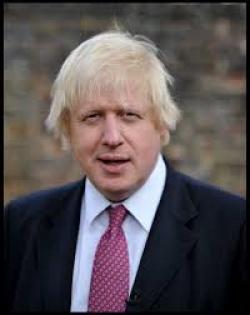By John Pickard
Is Boris Johnson shaping up to be the golden boy that Tory hopefuls wanted? Or are his public appearances just re-emphasising that he is the Golden Buffoon? This week has seen Boris make his first major election speech, face a real live radio audience and then, a few days later, face Jeremy Corbyn in a head-on clash on national TV. Johnson is quickly coming to realise that elections are serious issues and his empty bluff and bluster don’t always come off very well. When the completely fake image of Johnson that has been created by the national newspapers is exposed to real issues and real people, his high flown rhetoric begins to look a little hollow.
After his long-awaited first major keynote speech, John Crace, the satirical Guardian columnist had some fun with it. (November 14th), “Not that this could really be classified as a speech”, he wrote, “Rather a collection of assorted thoughts and lies that had been strung together at the last moment. He began bizarrely comparing the UK economy over the past nine years to a racehorse with three legs. Boris didn’t appear to know that horses in this condition get shot on the spot.”
Relating to people? “I haven’t the faintest idea”
That more or less set the standard for all of Johnson’s engagements with the public. Later in the week, Johnson was given a one-hour grilling on BBC Radio 5 Live. We have come to expect the BBC News and Current Affairs team to let any Tories off lightly – they reserved their poor manners and interruptions for Labour spokespeople – but in this case it was listeners asking the questions.
Asked how families across the country would relate to him, Johnson flapped and muttered for a while, before admitting, “I have not the faintest idea.” He tried to avoid any blame for the London ‘garden bridge’ fiasco that cost the taxpayer more than £50m while he was London mayor, happily approving spending on this vanity project. He then repeated the claim that there would “absolutely” be no paperwork for any Northern Ireland goods moving to the UK, a claim explicitly contradicted by his Brexit secretary, Stephen Barclay, and demonstrating that Johnson can lie in the most brazen manner about the EU deal he negotiated.
During the TV debate itself, Johnson was completely fixated with Brexit and getting it “done”. It is a pity that Jeremy Corbyn didn’t have a better answer to Johnson’s continued harping on about where he (Corbyn) would stand in another EU referendum, other than by simply ignoring the question. It did appear to leave Corbyn exposed somewhat. But, on the other hand, Johnson did himself no favours by demonstrating he was a one-trick pony, with “getting Brexit done” being the answer he gave to almost every single question, much to the amusement of the audience.
Asked a question about personal integrity and whether truth matters, Johnson’s answer was met with some laughter and someone called out, “Tell the truth, then!”
The day after the debate, Rupert Murdoch’s Tory-supporting Times said it was “neck and neck”, which probably means that Corbyn won it. The Financial Times headline suggested that Johnson “survived” the “hazardous duel” which is also probably code for ‘Corbyn won’.
It is still too early to call and opinion polls are biased and unreliable. One YouGov poll taken immediately after the TV debate, but only including 1000 participants, concluded by the narrow margin of 51 to 49 that Johnson had come out on top of the debate. But another, by ITV, involving 30,000 participants and taken on Twitter in the closing stages of the debate reported that 78 percent thought Jeremy Corbyn had won the debate. The website of billionaire, Michael Bloomberg reported, “it was the often underrated Corbyn, lagging 11 points in opinion polls, who surprised on the night. A snap survey declared the debate a tie, and 67% of respondents said Corbyn performed well.” Which, again, probably means he won.
“FactcheckUK”…shouldn’t that be “fat cheque UK”?
One of the big stories after the debate was the fact that the Tories made a concerted attempt to mislead the public by rebranding their official Twitter account as “factcheckUK” during the debate. It was then used to publish anti-Labour posts. Bearing in mind that there are a lot of “fact check” newspaper columns and websites, this was a deliberate attempt to deceive, typical of Tory methods. It even drew a sharp rebuke from the parent company, Twitter, who warned that it would not be tolerated in future. Oblivious as ever to the lies they peddle, Tory Foreign Secretary, Dominic Raab commented that “no-one gives a toss” about social media.
The election is still too close to call and in three weeks a lot can happen. The volatility of politics is such that even minor and incidental issues can swing opinions. Boris Johnson’s complacent and answer to the TV question on the monarchy – that it is “beyond reproach” – is a case in point. It will have turned off a lot of uncommitted voters, in contrast to Corbyn’s answer that it “needs improvement”.
The Brexit Party, once as high as 10 or 12 per cent in the polls, seems to be squeezed, now that Johnson’s one and only mantra has been “get Brexit done”. The Guardian (November 12th) reported that four polls in the previous weekend had put the Brexit Party on 7.5%, in which case it would not win a single seat in parliament. Moreover, according to their correspondent, “Labour is modestly recovering among leave voters. According to polling firm Opinium, Labour has overtaken the Brexit Party among all leave voters for the first time…” Time will tell.
November 20, 2019



